Russia warns against new strikes on Iran’s nuclear sites
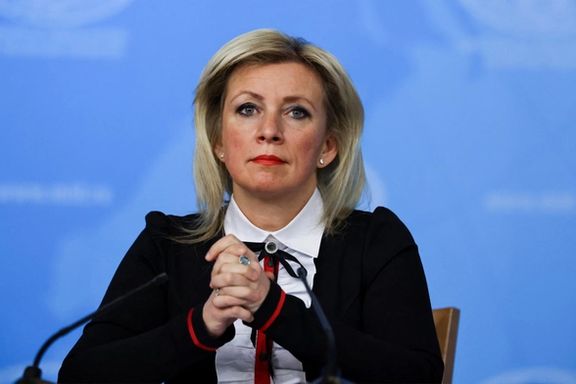
Russia said on Wednesday that attacks on Iran’s nuclear facilities must not become routine and warned of the catastrophic risks such strikes could pose.

Russia said on Wednesday that attacks on Iran’s nuclear facilities must not become routine and warned of the catastrophic risks such strikes could pose.
Russian Foreign Ministry spokeswoman Maria Zakharova said that a pledge to avoid further strikes was a necessary condition for restarting cooperation between Iran and the International Atomic Energy Agency (IAEA), which has been limited in its access to Iranian sites.
Dialogue with China and Iran
Zakharova pointed to recent trilateral talks between Iran, Russia, and China as a sign that a nuclear agreement remains possible through diplomacy. She said ongoing dialogue could create space for progress, if conducted in good faith.
She referred to joint meetings in New York and Tehran where the three sides discussed ways to protect the 2015 nuclear deal and coordinate against efforts to revive UN sanctions. Russia said it supports a diplomatic framework that includes security assurances and avoids military pressure.
Beijing and Moscow have expressed support for Iran’s call for a new model of cooperation with the IAEA, after Iran’s parliament voted in late June to suspend collaboration with the agency following a ceasefire with Israel and demanded security guarantees before restoring access.
Pressure builds over snapback threat
The statements come as Iran, China and Russia have held joint meetings in New York and Tehran to coordinate their stance on the risk of snapback UN sanctions, penalties lifted under the 2015 nuclear deal that could return if no new agreement is reached.
Iranian officials have warned they may leave the Nuclear Non-Proliferation Treaty (NPT) if European powers, France, Germany and the UK, trigger the mechanism, which they have threatened to do by the end of August.
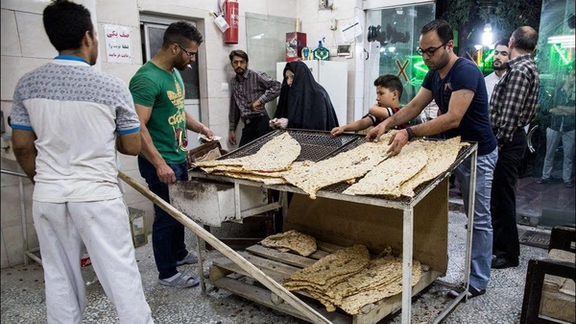
Bread prices have surged nationwide in Iran, with Tehran registering hikes of up to 50 percent, state media reported Wednesday, as inflation continues to squeeze household budgets and frustrate bakers.
In the capital, the price of Barbari—a widely consumed semi-flat bread—rose 31 percent to 46,000 rials (about $0.05), while the popular flat bread Taftoon jumped 52 percent to 20,000 rials ($0.02), and Lavash climbed 39 percent to 15,500 rials ($0.017).
Sangak, another staple, was set at 76,000 rials ($0.085), with a 20,000 rial ($0.022) surcharge for sesame toppings.
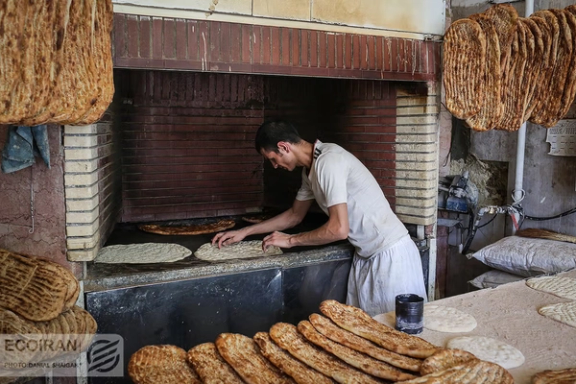
“The price of Barbari should have increased by at least 52 percent,” said Amir Karamlou, spokesman for Tehran’s traditional bakers’ union, adding that the current hike in the capital falls short of what was approved for other provincial capitals.
Reports from IRGC-linked Fars News highlighted a growing gap between official rates and prices charged by bakeries, which, while struggling to make ends meet, are keeping prices higher than those stipulated by the government.
The hike follows protests in recent months by bakers over cuts to subsidized flour. Some told Iran International they had already been forced to sell Sangak at 100,000 to 200,000 rials ($0.11- $0.22), citing flour shortages and black-market pricing.
Meanwhile, some provinces have yet to formally implement the government's increases, Mehr News reported, citing disputes over pricing authority and scope.
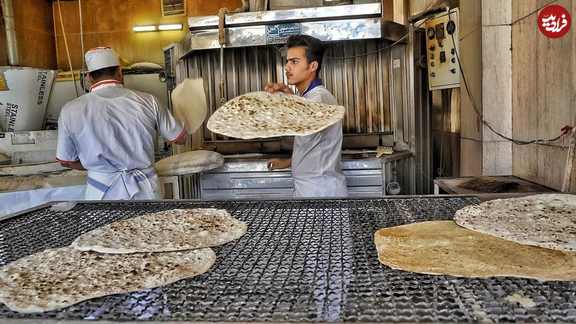
However, with the minimum monthly wage now worth just $120, well below the estimated $400 needed for basic living, the pressure on consumers continues to mount.
At least one third of the country now lives below the poverty line as the country's floundering economy continues to make life in the country ever more difficult.
Iran’s year-on-year inflation rate rose to 41.2% in July, marking the highest level in two years, according to the country’s Statistical Center. The 41.2% figure means households paid over 40% more for the same basket of goods and services compared to July last year.
The figure reflects an increase from 39.4% in June and comes amid a broader surge in prices for essential goods and food items.
The latest consumer price index report, released this week, showed that annual, monthly, and point-to-point inflation all climbed in the fourth month of the Iranian calendar year,which ended on July 22.
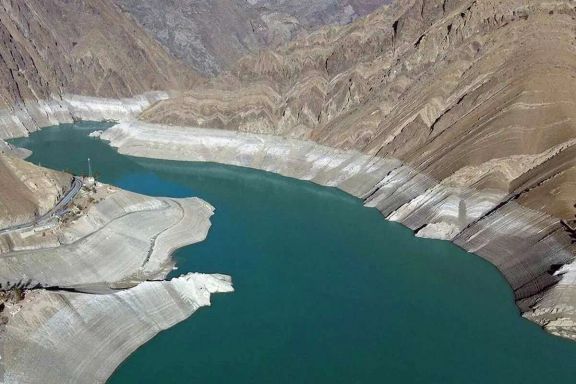
Karaj Dam, which supplies around 25% of Tehran’s drinking water, has dropped to its lowest level in 64 years, exacerbating widespread water outages across the Iranian capital.
Residents in various districts describe inconsistent access, with high-rise buildings experiencing more severe cuts.
Authorities have advised installing pumps and storage tanks, but many complain water pressure is too low to make them effective. Power cuts also complicate the situation.
Field observations by Shargh newspaper show that Karaj Dam, normally holding up to 180 million cubic meters, now stores only around 60 million — one-third of its capacity. Of that, only a fraction is usable, as sediment and “dead water” account for an estimated 15% of the volume. Dam managers confirm a 45-meter drop in reservoir height from full capacity.
Mohammad Ali Moallem, the director of Karaj Dam, told Shargh that the reservoir has dropped to its lowest level in 64 years.
Authorities attribute the crisis to reduced rainfall, with Tehran province receiving just 185 mm this year — placing it among the top five water-stressed regions in the country.
Officials in Tehran blame drought and public overuse for Iran’s worst water shortage in living memory.
National figures show just 9.5% of Iran’s water goes to households and commerce, while agriculture consumes 86.5%, often with inefficient practices and low economic returns. Internal migration and aging infrastructure have further strained Tehran’s water system, making it the second most water-poor province after Sistan-Baluchistan.
In the capital Tehran, officials have attempted to curb consumption through emergency measures, including repeated water and electricity outages and temporary office closures on certain days.
An Iranian government plan to close workplaces and schools one day a week in response to worsening electricity and water shortages has sparked widespread criticism, with many citizens warning it will only deepen daily hardships.
The Islamic Revolutionary Guard Corps (IRGC) has built over 60 dams in recent decades. More than half are now empty, with hydropower generation operating at just one-third of its nominal capacity.
The United States on Tuesday criticized Iran’s leadership over the ongoing nationwide crisis.
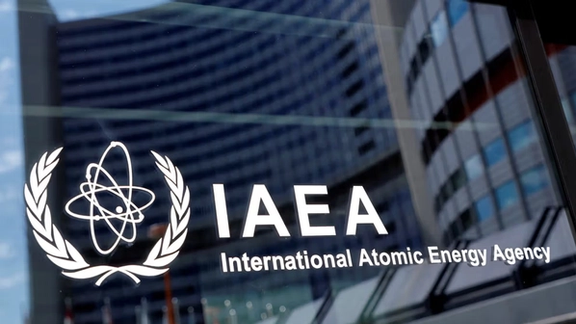
The Supreme Leader-affiliated newspaper, Kayhan, has accused the International Atomic Energy Agency of acting as a tool for Western intelligence, following new legislation last month that imposed restrictions on the UN nuclear watchdog's activities in the country.
“When the IAEA effectively plays the role of America and the Zionist regime’s eyes, Iran must firmly resolve to blind the eyes of Mossad and the CIA,” the paper said on Monday, citing espionage devices allegedly hidden in personal belongings.
Earlier this month, Mahmoud Nabavian, deputy chair of parliament’s National Security Committee, said that “suspicious espionage chips” had been discovered in the shoes of IAEA inspectors during visits to Iranian nuclear sites.
“Iran must now act decisively to neutralize these threats,” Kayhan added.
Parliament passed legislation in late June to suspend cooperation with the agency, accusing it of having given intelligence to the US and Israel which helped attacks on nuclear facilities, key personnel and sensitive sites in the country in last month's 12-day war.
Under the law, future inspections require approval from the Supreme National Security Council -- under the supervision of Supreme Leader Ali Khamenei -- and the agency must guarantee nuclear site security.
Foreign Ministry spokesman Esmail Baghaei said on Monday that a new framework for cooperation with the agency was under discussion.
“We remain a party to the safeguards agreements and a senior agency official will visit Iran within two weeks,” he said.
Last week, Grossi said that Iran has signaled readiness to resume technical-level discussions with the UN nuclear watchdog, though any planned visit would not yet involve inspectors.
kayhan warned, “This disgraceful record demands that all interactions with the agency be conducted with maximum caution and a thoroughly distrustful outlook."
Judicial official Ali Mozaffari said this month that Iran may try IAEA Director General Rafael Grossi in absentia over his alleged role in facilitating attacks on Iran’s nuclear facilities.
Grossi has faced consistent criticism from Iranian outlets for political bias, including Kayhan’s earlier call for his arrest and execution.
Britain, France, and Germany condemned the threats and expressed full support for Grossi and the agency’s mandate.
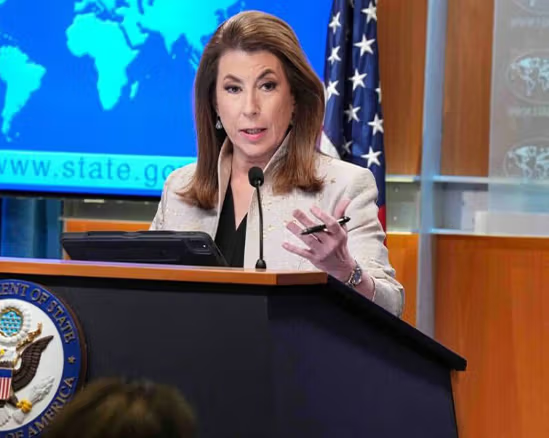
The US State Department on Tuesday declined to comment on reports that Iran had arrested two American Jewish citizens on suspicion of spying for Israel in the aftermath of the recent 12-day war.
One of the two detainees, identified by HRANA as 70-year-old Yehuda Hekmati, remains in detention.
Hekmati, a jeweler with ties to New York, allegedly drew the attention of the Islamic Republic due to a trip he made to Israel seven years ago.
The second detainee, an Iranian-American resident of Los Angeles, has been released on bail.
US State Department spokesperson Tammy Bruce declined to comment on the case Tuesday, saying only that she hopes she would be able to speak about it soon.
The State Department has repeatedly warned that Americans, including dual nationals, risk wrongful detention in Iran.
The department's website says: "Americans, including Iranian-Americans and other dual nationals, have been wrongfully detained, taken hostage by the Iranian government for months, and years."
Israel’s Channel 11 quoted a source involved in the American detainees’ case as saying, “These two Americans were in the wrong place at the wrong time.”
Crackdown on minorities and foreign nationals
In the aftermath of the war, Iranian authorities have intensified pressure on religious and ethnic minority groups, as well as foreign nationals, in what experts describe as an attempt to reassert control, deflect blame, and silence dissent.
Iran’s Jewish community has faced unprecedented scrutiny. Dozens have been interrogated over contacts with family in Israel, and Jewish conscripts have reportedly been forced to participate in loyalty demonstrations to the Islamic Republic.
Foreign nationals have not been spared. Several Europeans have been detained on charges of cooperating with Israel. French citizens Cécile Kohler and Jacques Paris, held in Iran since 2022, now face new espionage charges that could carry the death penalty.
Iran’s judiciary chief recently announced that over 2,000 people have been detained since the war with Israel, some facing charges of “organized collaboration with the enemy”—a charge that can carry the death penalty.
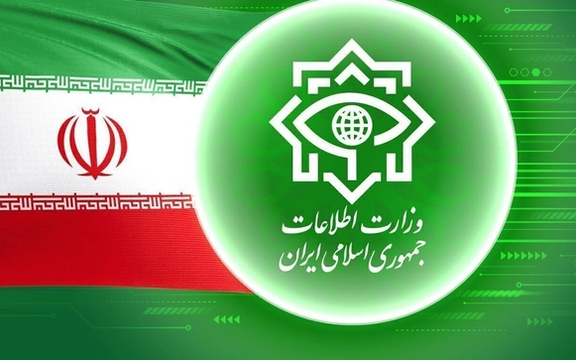
Iran's intelligence ministry issued a lengthy statement asserting alleged successes amid a punishing 12-day war with Israel last month which it said scotched elaborate regime change plans by an array of foreign and domestic enemies.
The ministry said it had thwarted assassinations plots against 35 officials, conducted raids and made arrests targeting the Baha'i religious minority, evangelical Christians, foreign-baed dissidents, Sunni Muslim jihadists, separatists, monarchists and media organizations acting in league with Israel.
Hundreds of military personnel, nuclear scientists and civilians were killed in Israel's surprise campaign last month including top commanders, in major intelligence lapses the statement appeared aimed at addressing.
"What happened during the 12-day imposed was a war plan with planning and full-scale utilization of combined military, security, intelligence, cognitive warfare, disruptive actions, assassination, sabotage, destabilization and incitement of internal unrest," the statement issued on Monday said.
The multifarious plots, it added, were "aiming for the delusion of subjugating and forcing Iran to surrender and overthrowing the sacred Islamic Republic,” it added.
Israel was able to launch deadly attack drones at senior military Islamic Revolutionary Guards Corps (IRGC) leaders from inside the country, killing the armed forces chief of staff, IRGC leader and the elite unit's commanders of aerospace and military operations.
An Iranian analyst alleged in a newspaper interview last week that Israel caused over 100 Iranian missile launchers to explode upon activation during the war last month and that it had hacked the country’s entire air defense system.
The daughter of a top Iranian military commander assassinated by Israel last month said her father was chased down and killed by Israeli agents in a hot pursuit in Tehran and not an airstrike as originally reported.
Not offering explanations for any lapses, the ministry said it "detected and neutralized" Israeli plots to assassinate 23 senior civilian and military officials during the conflict and 13 similar attempts in the months leading up to it.
'Thugs, rebels'
The ministry alleged that it had carried out successful intelligence operations inside Israel, saying its activities were ongoing.
"Numerous and varied offensive and intelligence measures (aggressive espionage) were carried out in various cities of the occupied territories against the interests of the Zionist regime and the criminal gang that rules it."
Israeli authorities say they have uncovered more than 25 cases of Iranian recruitment over the past year, with more than 35 people indicted on serious security charges.
"One of the approaches implemented was to recruit intelligence and operational agents from the regime’s innermost military and security layers," the ministry added. "The larger and more sensitive part of the missions is still ongoing."
The ministry said it had faced down threats from street thugs to the NATO alliance.
"The enemy sought to activate criminals, diverse terrorists in various guises, deploy awaiting spies, conduct assassinations and sabotage, and to mobilize mercenaries, monarchist remnants, thugs, rebel groups, and dormant hypocrite cells to inflame tensions, provoke dissatisfaction and professional protests, and turn conditions into uncontrolled street riots and chaos”, the statement said.
"We faced not only the petty Zionist regime but also the Western intelligence-security NATO,” it added.
A June 23 Israeli air attack on Evin Prison - known for housing dissidents and foreign detainees - was aimed at catalyzing a nationwide revolt, the ministry alleged. Iranian authorities said 80 people were killed in the attack and Amnesty International called for it to be investigated as a war crime.
“We detected and fully neutralized a Mossad-directed monarchist plot to launch and dispatch armed operational teams from across the country to Tehran on June 22 for terrorist actions the next day (during the Evin prison bombing) targeting nearby military and law enforcement centers," the ministry said.
“This monarchist-Zionist scenario was thwarted by identifying involved agents, striking enemy operational teams, and arresting 122 mercenaries across 23 provinces before any terrorist action in Tehran."